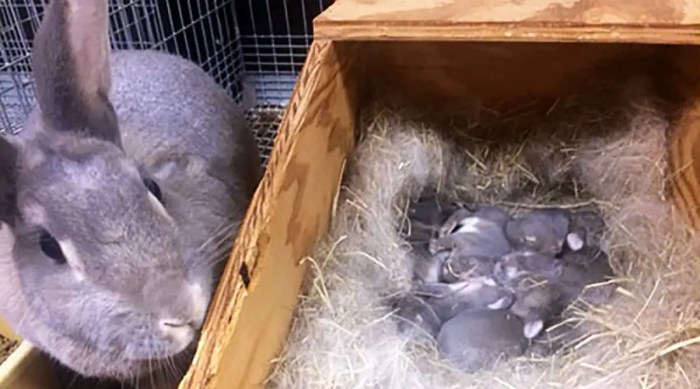Pregnancy in rabbits can be a joyful and exciting time for owners. However, determining whether your rabbit is pregnant can be challenging, as rabbits do not exhibit the same obvious signs as other animals. This comprehensive guide will provide you with various methods to help you identify if your rabbit is pregnant, ensuring the best possible care during this crucial period.
Understanding the signs and symptoms of pregnancy in rabbits requires a combination of observation, physical examination, and veterinary consultation. By carefully monitoring your rabbit’s behavior, appearance, and seeking professional guidance, you can accurately determine the pregnancy status and provide appropriate care.
Palpation
Palpation involves gently feeling the rabbit’s abdomen to detect changes in size and shape. It’s a useful method for determining pregnancy, but it requires experience and a gentle touch.
To perform palpation, place the rabbit on a flat surface and gently hold it in place. Use your fingertips to gently palpate the abdomen, starting from the rib cage and moving towards the pelvis. Feel for any lumps or swellings that may indicate pregnancy.
Tips for Distinguishing Pregnancy from Other Conditions
- Pregnancy: The abdomen will feel firm and slightly rounded, with palpable fetuses that move freely.
- Obesity: The abdomen may feel soft and doughy, with no palpable fetuses.
- Bloating: The abdomen may feel distended and hard, with no palpable fetuses.
It’s important to handle the rabbit gently during palpation and avoid excessive pressure. If you’re unsure about the results, consult with a veterinarian for confirmation.
Changes in Behavior
Pregnant rabbits may exhibit noticeable changes in their behavior. Observing these changes can provide additional clues to their pregnancy status, especially when combined with other indicators.Rabbits may engage in increased nesting activity during pregnancy. They may collect hay, straw, or other soft materials and arrange them in a secluded area of their enclosure.
This behavior serves to create a comfortable and safe space for the upcoming litter.Changes in appetite can also be a sign of pregnancy. Some rabbits may experience increased hunger, while others may have reduced appetites. This variation can depend on the individual rabbit’s metabolism and the stage of pregnancy.Pregnant
rabbits may also display reduced activity levels. They may spend more time resting and conserving energy for the demands of pregnancy and birth. However, it’s important to note that not all pregnant rabbits will show significant changes in activity levels, and individual behavior patterns should be considered.These
behavioral changes should be interpreted in conjunction with other indicators of pregnancy, such as palpation and weight gain. Observing a combination of signs can help provide a more accurate assessment of the rabbit’s reproductive status.
Physical Appearance
During pregnancy, rabbits undergo several physical changes that can indicate their condition. These changes can vary depending on the stage of pregnancy and the individual rabbit’s body composition.
One of the most noticeable physical changes is weight gain. As the pregnancy progresses, the rabbit’s abdomen will expand and she will gain weight due to the growth of the fetuses and the increased blood supply to the uterus. The weight gain is typically gradual and may not be noticeable until the later stages of pregnancy.
Enlarged Abdomen
The enlarged abdomen is a key indicator of pregnancy in rabbits. As the fetuses grow, the uterus expands, causing the abdomen to swell. The swelling is most pronounced in the later stages of pregnancy and can make the rabbit appear noticeably round or pear-shaped.
Changes in the Vulva
Changes in the vulva can also be a sign of pregnancy in rabbits. During pregnancy, the vulva may become slightly swollen and pinker in color. Additionally, a clear or milky discharge may be present, which is a normal sign of pregnancy.
Ultrasound
Ultrasound is a non-invasive imaging technique that uses high-frequency sound waves to create images of the inside of the body. It can be used to detect pregnancy in rabbits by visualizing the developing fetuses within the uterus.Ultrasound is a highly accurate method of pregnancy detection, and it can be used to confirm pregnancy as early as 10-12 days after conception.
It can also be used to estimate the number of fetuses and assess their viability.
Procedure
Ultrasound is performed by placing a transducer on the rabbit’s abdomen. The transducer emits high-frequency sound waves that travel through the body and are reflected back to the transducer. The reflected sound waves are then processed by a computer to create images of the inside of the body.Ultrasound
is a safe and painless procedure, and it does not require any sedation or anesthesia. However, it is important to note that ultrasound can only be performed by a trained veterinarian or technician.
Final Conclusion

Determining pregnancy in rabbits involves a multifaceted approach that includes observing behavioral changes, physical transformations, and utilizing diagnostic tools like ultrasound. By combining these methods and consulting with a veterinarian, you can confidently ascertain your rabbit’s pregnancy status and prepare for the arrival of new additions to your furry family.
Remember, providing a supportive and nurturing environment throughout the pregnancy journey is essential for the well-being of both the mother and her offspring.
Common Queries
How long does a rabbit’s pregnancy typically last?
The gestation period in rabbits is approximately 30-32 days, with an average of 31 days.
Can I feel my rabbit’s babies moving during pregnancy?
It is not advisable to attempt to feel your rabbit’s babies moving during pregnancy, as excessive handling can cause discomfort or harm to the developing fetuses.
What should I feed my pregnant rabbit?
Pregnant rabbits require a diet rich in nutrients, including unlimited access to hay, fresh vegetables, and a small amount of high-quality pellets. Consult with your veterinarian for specific dietary recommendations.
When should I take my pregnant rabbit to the vet?
It is recommended to schedule a veterinary checkup before breeding your rabbit and again during the early stages of pregnancy to ensure her overall health and discuss any necessary precautions.